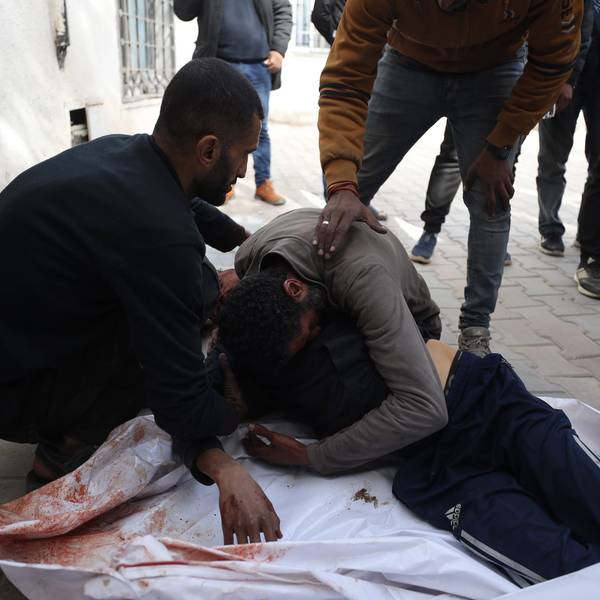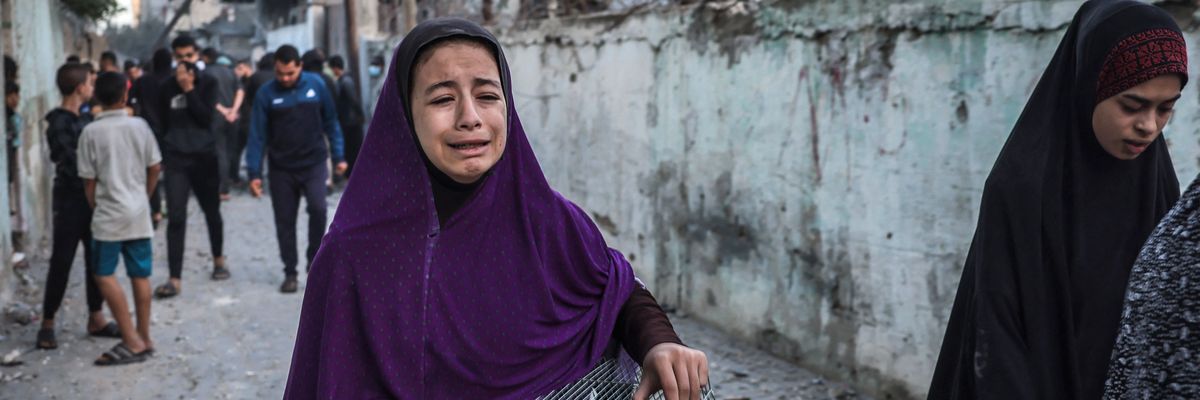The Nation this week published a piece about Israel's genocidal war on the Gaza Strip that the Harvard Law Review commissioned from a Palestinian scholar but then refused to run after several days of internal debate, a nearly six-hour meeting, and a board vote.
The essay—"The Ongoing Nakba: Towards a Legal Framework for Palestine," by Rabea Eghbariah, a human rights attorney and doctoral candidate at Harvard Law School—begins: "Genocide is a crime. It is a legal framework. It is unfolding in Gaza. And yet, the inertia of legal academia, especially in the United States, has been chilling."
The controversy over Eghbariah's own piece helps prove his point. In an email to Eghbariah and
Harvard Law Review president Apsara Iyer, online chair Tascha Shahriari-Parsa, one of the editors who commissioned the blog article, called the bid to kill it an "unprecedented decision" by the academic journal's leadership.
The Intercept reported on that email and others from those involved:
"As online chairs, we have always had full discretion to solicit pieces for publication," Shahriari-Parsa wrote, informing Eghbariah that his piece would not be published despite following the agreed-upon procedure for blog essays. Shahriari-Parsa wrote that concerns had arisen about staffers being offended or harassed, but "a deliberate decision to censor your voice out of fear of backlash would be contrary to the values of academic freedom and uplifting marginalized voices in legal academia that our institution stands for."
Both Shahriari-Parsa and the other top online editor, Sabrina Ochoa, told
The Intercept that they had never seen a piece face this level of scrutiny at the Law Review. Shahriari-Parsa could find no previous examples of other pieces pulled from publication after going through the standard editorial process.
In a statement, the
Harvard Law Review said that it "has rigorous editorial processes governing how it solicits, evaluates, and determines when and whether to publish a piece. An intrinsic feature of these internal processes is the confidentiality of our 104 editors' perspectives and deliberations. Last week, the full body met and deliberated over whether to publish a particular blog piece that had been solicited by two editors. A substantial majority voted not to proceed with publication."
According to
The Nation, 63% of editors who participated in the anonymous vote opposed publication.
"At a time when the Law Review was facing a public intimidation and harassment campaign, the journal's leadership intervened to stop publication," 25 editors said in a statement shared with The Nation and The Intercept. "The body of editors—none of whom are Palestinian—voted to sustain that decision."
"We are unaware of any other solicited piece that has been revoked by the
Law Review in this way," they added. "This unprecedented decision threatens academic freedom and perpetuates the suppression of Palestinian voices. We dissent."
Eghbariah wrote in an email to an editor: "This is discrimination. Let's not dance around it—this is also outright censorship. It is dangerous and alarming."
It is also part of a broader trend identified by more than 1,700 lawyers and law students. In a letter to the American Bar Association last week, they noted "increasing instances of discrimination and censorship faced by Palestinian, Muslim, Arab, South Asian, Black, Indigenous, immigrant, and other communities within law schools, universities, law firms, and other corporate entities, particularly due to their expression of support for the Palestinian people."
Since Israel declared war in response to a Hamas-led attack on October 7, genocide experts around the world have used the term to describe Israeli airstrikes and raids that have killed more than 14,500 Palestinians in Gaza—among them over 6,000 children—and destroyed infrastructure including residential, educational, medical, and religious buildings.
"Some may claim that the invocation of genocide,
especially in Gaza, is fraught. But does one have to wait for a genocide to be successfully completed to name it? This logic contributes to the politics of denial," Eghbariah wrote in his essay.
After pointing to both statements from Israeli politicians and the forming consensus among genocide scholars, he stressed that "genocide is the material reality of Palestinians in Gaza: an entrapped, displaced, starved, water-deprived population of 2.3 million facing massive bombardments and a carnage in one of the most densely populated areas in the world."
"And yet, leading law schools and legal scholars in the United States still fashion their silence as impartiality and their denial as nuance. Is genocide really the crime of all crimes if it is committed by Western allies against non-Western people?" he added. "This is the most important question that Palestine continues to pose to the international legal order. Palestine brings to legal analysis an unmasking force: It unveils and reminds us of the ongoing colonial condition that underpins Western legal institutions."
Eghbariah also explained the term Nakba, or "catastrophe," which is used to describe the ethnic cleansing of over 750,000 Palestinians during the creation of the modern state of Israel in the 1940s—and argued that "the Nakba is ongoing."
"The Nakba is both the material reality and the epistemic framework to understand the crimes committed against the Palestinian people," he wrote. "And these crimes—encapsulated in the framework of Nakba—are the result of the political ideology of Zionism, an ideology that originated in late 19th-century Europe in response to the notions of nationalism, colonialism, and antisemitism."
"We must imagine that one day there will be a recognized crime of committing a Nakba, and a disapprobation of Zionism as an ideology based on racial elimination. The road to get there remains long and challenging, but we do not have the privilege to relinquish any legal tools available to name the crimes against the Palestinian people in the present and attempt to stop them," he concluded. "The denial of the genocide in Gaza is rooted in the denial of the Nakba. And both must end, now."




